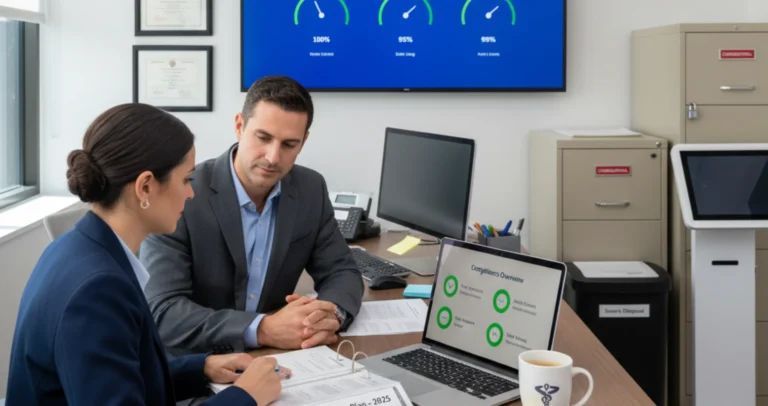Joseph Sena
HIPAA Compliance for SMBs: What Every Healthcare Leader Needs to Know

HIPAA compliance is essential for SMBs that handle patient information or support healthcare organizations. It protects patient trust and keeps your business running.
In 2024, more than 259 million Americans’ health records were exposed, with a single vendor breach at Change Healthcare accounting for 100 million records on its own. These numbers demonstrate that even the smallest organizations are vulnerable to attack.
You feel the pressure from every direction. As a leader, you must balance growth with the risk of six-figure fines and potential fallout to public trust.
Your IT team safeguards health records, billing systems, and remote tools. Your compliance lead must prove safeguards meet HIPAA standards. Often, this happens without a dedicated budget or team.
This guide explains HIPAA in plain language. It highlights where SMBs often fall short and provides practical solutions to stay compliant without increasing headcount.
Key takeaways
- Protect your patients’ data and reputation with clear HIPAA compliance safeguards tailored for SMBs.
- Stay compliant without hiring a full-time HIPAA officer by using clear policies and expert support.
- Close security gaps such as weak access controls, outdated backups, and missing risk assessments.
- Train your team with expert-led programs, clear policies, and ongoing monitoring to reduce human risk.
- Focus on growth while a managed IT partner keeps you HIPAA-compliant and audit-ready.
What is HIPAA, and why does it matter for SMBs?
HIPAA may sound like a significant hospital issue, but it also applies to you. Understanding what it covers helps you avoid mistakes that can result in financial, time, and patient trust losses.
Brief history and purpose of HIPAA
If you handle patient information, HIPAA affects you. The Health Insurance Portability and Accountability Act (HIPAA) was enacted in 1996 to protect sensitive health information and establish national standards for the privacy and security of that information.
These rules cover how protected health information (PHI) and electronic PHI (ePHI) must be stored, shared, and secured.
For small healthcare businesses, HIPAA compliance is not just about paperwork; it’s about protecting sensitive patient information. It is the foundation of patient trust and legal protection.
Covered entities and business associates
HIPAA applies to three types of covered entities: healthcare providers, health plans, and healthcare intermediaries. If you run a dental practice, a physical therapy clinic, or a health-tech startup that handles billing data, you qualify.
It also applies to any business associate that processes PHI on your behalf, such as billing services or cloud EHR vendors. You must have business associate agreements (BAAs) in place so that those partners follow the same security rules you do.
Examples of sensitive data SMBs may handle
PHI includes patient names, birth dates, addresses, lab results, insurance claims, and payment information. If it can identify a patient and relate to their care, HIPAA protects it.
Knowing what constitutes PHI is the first step toward implementing the proper safeguards.
The risks of non-compliance
Knowing the rules is only half the battle. Failing to follow them can result in steep fines, public exposure, and significant operational headaches.
Fines and penalties for HIPAA violations
HIPAA violations can result in fines ranging from hundreds of dollars to millions of dollars, depending on the severity and intent.
The Department of Health and Human Services (HHS) enforces four penalty tiers that escalate quickly for repeated offenses. Regulators are active, with 22 enforcement actions in 2024, one of the busiest years on record.
Data breaches and reputational harm
Data breaches are expensive and highly visible. When PHI is exposed, the Breach Notification Rule requires you to notify patients, HHS, and sometimes the media.
The average cost of a healthcare data breach now stands at $9.8 million, the highest among all industries. For an SMB, that number can be devastating.
Operational disruptions from investigations and audits
Investigations disrupt operations, forcing your team to gather records, produce evidence, and fix compliance gaps. For SMBs with lean staff, this can delay billing, slow patient care, and impact cash flow.
Common HIPAA compliance challenges for SMBs
Even with the best intentions, staying HIPAA compliant can be challenging for small healthcare businesses. Recognizing these common gaps enables you to focus your efforts where they matter most.
Close the gap in in-house compliance expertise
Many small practices think they are compliant, but the numbers tell a different story. While 98% of small practices believe they are compliant, 99% reveal gaps, such as unencrypted email or missing access logs.
Without a dedicated resource for compliance requirements, regular risk assessments, and documentation, essential steps are often skipped. Working with outside experts helps you stay aligned with the HIPAA Privacy Rule and Security Rule without overextending your team.
Secure mobile devices and remote workers
Remote work offers convenience, but it also poses risks. Lost laptops, personal phones, and unsecured Wi-Fi can expose PHI.
Adding authentication tools, mobile device management, and secure VPN access helps prevent unauthorized access and keeps data safe wherever your team works.
Fix inconsistent data backup and access controls
If your backups are outdated or your permissions are too open, attackers have an easy way in. Weak access controls make it easy for unauthorized individuals to view or modify patient data.
Role-based permissions and regular backup tests keep your systems secure and prevent issues from being exploited by attackers.
Strengthen employee training on cybersecurity best practices
Give your team the training they need to become your best defense. Phishing click rates tripled in 2024, indicating that attackers are becoming increasingly effective at convincing users.
Regular employee training and phishing simulations help staff spot scams and prevent breaches. A culture of shared responsibility keeps data security at the forefront of everyday life.
How Parachute helps SMBs stay HIPAA compliant
You do not have to face compliance challenges alone. A managed IT partner enables you to implement robust controls, monitor your systems, and respond quickly to threats. This proactive approach keeps you HIPAA-compliant and reduces the risk of costly violations.
Use data encryption and secure storage
Managed IT providers establish technical safeguards, including device encryption, secure cloud storage, and controlled file sharing, to protect sensitive data. These steps keep PHI private and prevent leaks.
Providers also implement physical safeguards, such as locked server rooms and device tracking, providing you with complete protection.
Control access and enable authentication
Strong access control protects data. Your provider can set role-based permissions, least-privilege access, and MFA. Most compromised accounts lack MFA, so this one step blocks many attacks. Clear access policies also make audits smoother.
Monitor systems and patch continuously
Compliance is ongoing. Managed IT teams watch your network 24/7, run vulnerability scans, and apply patches quickly.
Fixing issues quickly prevents hackers from exploiting known weaknesses to gain unauthorized access. These actions establish a robust audit trail that demonstrates your commitment to compliance.
Protect backups and plan for continuity
Backups are your safety net. 95% of ransomware incidents attempt to corrupt or delete backups, and losing them doubles the chance you will have to pay ransom. Managed IT services automate backups, securely store copies, and regularly test recovery plans. This means you can get back online quickly after a breach or disaster.
Train staff to reduce human risk
Technology works best when your team is ready. Managed IT providers deliver security awareness training that teaches staff how to identify phishing attempts, protect PHI, and respond promptly to any suspicious activity.
Regular refreshers and simulations turn training into a habit.
Key benefits of partnering with a managed IT provider
A good IT partner does more than keep you compliant. They free up your time, reduce stress, and let you focus on patients instead of paperwork. 72% of medical practices increased cybersecurity investment in 2024 to reinforce patient trust, showing that HIPAA compliance is a growth priority, not just a legal requirement.
With a managed IT provider, you can:
- Cut your risk of HIPAA violations and expensive breaches.
- Predict your spending with flat-rate pricing and scalable support.
- Give your team more time to focus on care, growth, and innovation.
When compliance feels under control, you stop running fire drills and start leading with confidence.
Parachute’s HIPAA compliance support
Parachute is more than a vendor. Every member of our team is HIPAA-certified as a Business Associate, ensuring you have a dedicated compliance partner to help you maintain HIPAA compliance daily.
Tailored solutions for healthcare SMBs
Every practice is different. We build compliance solutions for covered entities and business associates, from solo providers to growing health-tech startups. Our approach aligns with your workflows and budget, making HIPAA compliance feel manageable rather than overwhelming.
Real-world scenarios: protecting patient data from threats
We have helped clients prevent ransomware from spreading, contain phishing attacks, and recover quickly from attempted breaches. These real-life successes demonstrate how proactive security safeguards patient data and ensures operations run smoothly.
Ongoing partnership, not a one-time audit fix
HIPAA compliance requires ongoing effort. We conduct regular risk assessments, keep your systems up to date, and train your staff to stay ahead of new threats. Instead of scrambling during an audit, you stay ready all year.
Compliance as a business advantage
HIPAA compliance for SMBs is more than a checkbox. It protects patient data, helps you avoid fines, and shows your business takes privacy seriously.
Compliance also gives you an edge. It builds trust, keeps systems ready for audits, and frees your team to focus on patients. It turns regulatory requirements into a competitive advantage.
Skip the scramble and get ahead. Start now to avoid fines, win trust, and grow your business with confidence.
Let’s make your practice HIPAA-ready.
Talk to Parachute today and get expert IT support that keeps you secure, compliant, and ready for every audit.
FAQs
How can healthcare organizations stay compliant with HIPAA regulations?
Follow the Privacy Rule and Security Rule. Use clear access policies, encrypt devices that store PHI, and use secure email for patient messages. Schedule regular risk reviews and collaborate with a trusted provider to maintain up-to-date safeguards.
What security measures help protect medical records?
Use role-based permissions, strong passwords, and multi-factor authentication: Encrypt laptops, backup drives, and cloud storage. Update software regularly, and train staff to recognize phishing attempts and handle patient data securely.
Why is risk management critical in the healthcare industry?
Risk management finds weaknesses before attackers do. Routine assessments reveal issues like open Wi-Fi, outdated antivirus software, or weak access logs. Fixing these gaps supports HIPAA compliance, protects data, and builds lasting patient trust.


